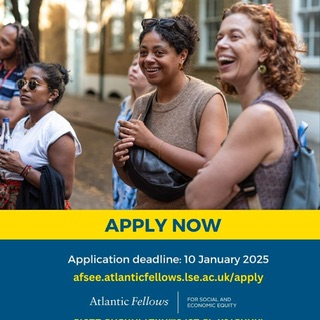Applications are now open for the Atlantic Fellows for Social and Economic Equity (AFSEE) programme for social-change leaders who are working to tackle inequality. Policymakers, researchers, activists, practitioners, artists, and movement-builders from around the world are invited to apply to the innovative, fully-funded, and inequalities-focused fellowship programme based at the International Inequalities Institute at the London School of Economics and Political Science.
Currently recruiting for its ninth cohort, the AFSEE Fellowship is aimed at mid-career social-change leaders who have at least seven years of experience in challenging inequalities. Applications are accepted from individuals working on any field of social and economic equity, including, but not limited to economic and social rights; sustainability and environmental justice; tax justice and economic alternatives; women’s, minority, and disability rights; rights to education; public policy; housing and urban inequalities; labour rights; community organising; arts and culture; and peacebuilding and transitional justice.
Launched in 2017, the AFSEE Programme aims to build a 400-strong inspiring community of Fellows over two decades. In its first eight cohorts, the programme has brought together 134 change-makers from 55 countries across the globe.
The AFSEE Fellowship, which offers both Residential and Non-Residential tracks, begins with an active fellowship year that offers an intensive period of learning and skills-building carried out in LSE’s research-rich environment informed by dialogic pedagogy and co-creation.
Fellows on the Residential track spend one year in London undertaking the MSc in Inequalities and Social Science degree at LSE, as well as participating in the programme’s four bespoke fellowship modules over the course of the year. The modules feature contributions from academics, practitioners, campaigners, and civil society professionals, and focus on the foundations of social and economic inequalities, policy for equity, challenging and transforming inequality, and debates around inequality
